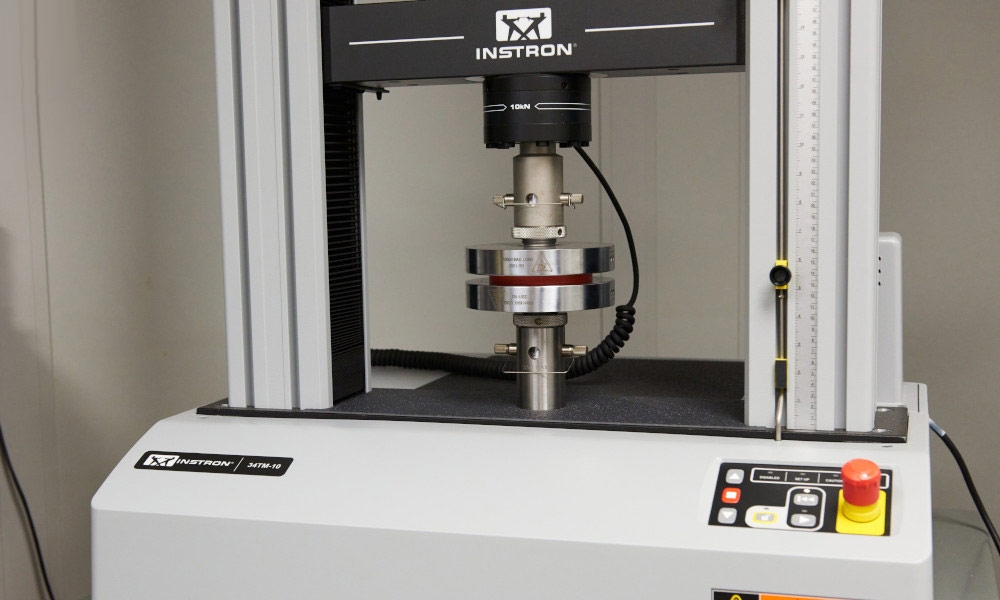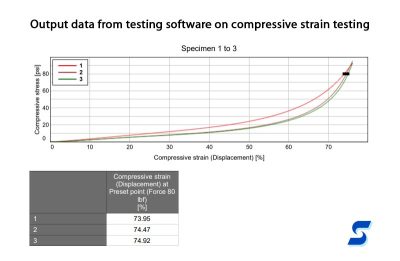
Stockwell Elastomerics has material testing capabilities for elastomers and fabricated rubber products at its Philadelphia, Pennsylvania (USA) manufacturing facility. Recent investments in research and development (R&D), material characterization, and material testing underscore the commitment to quality as an AS9100 certified, ISO 9001:2015 certified, ITAR registered manufacturer of custom components made of silicone rubber and similar high performance elastomers.
Why is Testing of Elastomeric Material Properties Important?
Mechanical properties like compression force deflection (CFD) and stress-relaxation can be difficult to understand but are extremely important in predicting long success of the cushioning or gasketing performance. Many applications are more sensitive than what can be discerned through a datasheet or even a certificate of analysis (COA). This can be critical in the testing and development phase, or as part of deeper production validation.
Stockwell Elastomerics understands the nuances of these specifications and can discuss them with customers to see if it makes sense for the application. For certain applications, Stockwell Elastomerics can also set up custom tests catered to the requirements. Not only can the test data be provided, but an explanation of what is going on and how it relates to the specific application can be included too.
Universal Testing for Mechanical Properties
Stockwell Elastomerics has invested in a universal testing system from Instron that greatly increases its in house testing capabilities. This recently acquired equipment has a maximum force output that is approximately ten times greater than the previous force tester. This robust testing system enables Stockwell Elastomerics to use test methods derived from ASTM standards with solid silicones at standard specimen sizes, including tensile testing and compression testing.
Tensile Testing
Tensile testing applies force to a specimen in order to measure the material’s response to pulling, or tensile, stress. The testing equipment that Stockwell Elastomeric uses consists of a single column frame equipped with a load cell, testing software, application specific grips, and extensometers. Instron load cells are accurate down to 1/1000 of load cell capacity. Extensometers are used for strain measurements and can detect changes to specimen length down to ±1 µm or 0.5% of reading.
Strain measures a material’s deformation under stress. It is defined as the change per unit length in a linear dimension of a part of a specimen and is usually expressed in % strain. Strain calibration is conducted using ISO or ASTM methods.
Compression Force Deflection (CFD) Testing
Stockwell Elastomerics supports customers that require compression force deflection (CFD) testing for materials and products. This video describes the use of the Instron Material Testing System to do in-house material testing.
Compression Testing
![]()
Compression testing is used to determine a material’s behavior under applied crushing loads. The test procedure uses platens or fixtures to apply compressive pressure to a test specimen. During compression testing, material properties are calculated and plotted as a stress-strain diagram. Also known as a stress-strain curve, this diagram is used to determine a material’s elastic limit, proportional limit, yield point, and yield strength.
- Elastic limit is the greatest stress that can be applied without causing permanent deformation.
- Proportional limit is the greatest stress that is directly proportional to strain.
- Yield point occurs when the material transitions from elastic behavior to plastic behavior.
- Yield strength is the stress at which a material exhibits a specified permanent deformation and is a practical approximation of the elastic limit.
Compression testing can also determine compressive strength, the maximum stress a material can sustain under crush loading. In a compression test, compressive strength is calculated by dividing the maximum load by the original cross-sectional area of a specimen.
 Another major addition is the introduction of Instron’s testing software, Bluehill Universal. Method templates for ASTM, ISO, and EN standards are built into the software, enabling consistent testing methodology and quick turnaround times. For more specialized testing, Bluehill Universal allows custom tests to be programmed directly into the machine. Cyclic tests such as ramp, hold, and triangle wave tests can also be programmed to find the response due to repeated loads.
Another major addition is the introduction of Instron’s testing software, Bluehill Universal. Method templates for ASTM, ISO, and EN standards are built into the software, enabling consistent testing methodology and quick turnaround times. For more specialized testing, Bluehill Universal allows custom tests to be programmed directly into the machine. Cyclic tests such as ramp, hold, and triangle wave tests can also be programmed to find the response due to repeated loads.
Contact Stockwell Elastomerics for Material Testing
Contact Us for further assistance with testing materials in conjunction with a design or manufacturing project.

